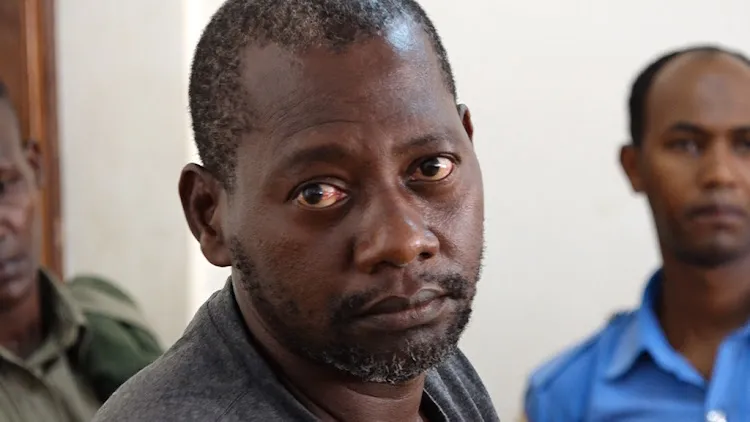Suspected Kilifi cult leader Paul Mackenzie presided over the burials of hundreds of his followers who succumbed during deadly starvation at the Shakahola Forest before he was arrested.
New documents supplied to the court indicate that Mackenzie praised those who were dying as heroes and encouraged many to keep on fasting and dying claiming the end times had come.
“Mackenzie presided over the burials, which he referred to as harusi (wedding) and the deceased were referred to as shujaas (heroes). These facts go to the strengths of evidence against Mackenzie and his accomplices,” said Chief Inspector Raphael Wanjohi, the lead investigator in the Shakahola massacre.
This information has been obtained from rescued survivors, who have been placed in various rescue centres, he said.
“Some of the survivors exhibit behavioural changes, where they have shaved their hair, and are giving scripted versions of the events in the forest. Some have refused to eat food given to them, medication and have refused to sign statements,” he said.
In the new affidavit filed before Shanzu court, Inspector Wanjohi informed Senior Principal Magistrate Yusuf Shikanda that a good number of adults and minor survivor witnesses have provided vivid accounts of the happenings in the forest, adversely citing some of the Mackenzie followers for violently supervising and overseeing enforced starvation of their own family members that were accompanied with beatings.
According to the survivors, Mackenzie chaired a meeting with his “close cabinet ” every Saturday, where he stated that fasting would start with the children until the last child died, then followed by youth, then women before men could complete the fast.
The evidence suggests that Mackenzie made it clear that he would be the last to die and ascend to ‘heaven’.
It has also emerged that the Director of Public Prosecutions Noordin Haji has reviewed several inquiry files containing preliminary findings of the Shakahola massacre and directed that several areas be covered extensively before a decision to charge Mackenzie, his wife Rhoda Maweu and 16 others, is made.
Some of the points of investigations to be covered, as identified by the DPP, are dependent on the completion of the exhumation exercise and the last body to be DNA profiled alongside other forensic analysis.
“Over 464 persons have provided DNA samples to the DNA centre to assist in identifying their missing family members that are either believed to have perished or reported to have been missing in relation to the Shakahola massacre,” said Mr Wanjohi.
‘Close cabinet’
Also, the court heard that most victims were exhumed tied with ropes which police hold reasonable grounds to believe were used to curtail the freedom of the deceased by those who supervised the fasting led by the ‘close cabinet’.
It has also emerged that out of the 30 suspects, 26 of them have disassociated themselves with Mackenzie in reference to the Shakahola massacre despite witnesses mentioning them as the ‘close cabinet’ that enforced the starvation law.
The court documents also indicate that Mackenzie monitored the starvation from his ‘Galillae’ residence where he lived with his wife Maweu.
According to the investigators, the survivors have divulged that in order to effectively administer and hold grip on his followers, Mackenzie created eight cities; Gallilea, Judea, Bethlehem, Jerusalem, Emaus, Sidonia, Tiru and Sikare, with each city under the administration and management of members that formed a “close cabinet” of trusted Mackenzie followers.
“There is credible evidence that the respondents occupied positions of responsibility in the close cabinet as administrators but this information needs to be corroborated by further investigations which include identification parades, DNA forensic analysis and bio data reports for proper identification and familial links between the survivors, respondents and the deceased,” said Senior Prosecution Counsel Jami Yamina.
The state alleges that the administrators of the eight cities controlled and doubled up as the team of security, transporters, gravediggers, and other trusted confidants reporting directly to Mackenzie.
The state alleges that these administrators also ensured there is enough fuel for transport within the forest, home constructors to build and maintain shanty mud wall houses, constrain and enforce Mackenzie’s teachings and beliefs, cooking and sourcing supplies from the outside which they referred to Kwa wa Mataifa or Babel.
“Mackenzie forbade any contact or movement to the outside world without his knowledge and permission. Those who broke the rules were punished,” said the officer.
So far, preliminary findings of the investigation has revealed that Mackenzie moved his church from Malindi to Shakahola forest and referred to it as Jangwani, where he invited his close adherence and associates that helped him lure many others who believed in his end times message.
Mackenzie further reached out to his audience through TV broadcasts via crusades and distribution of DVDs of his preachings through which he built a strong following that would later follow him to the forest where he would settle them and their families in the various “cities”
Statements
40 adult victims out of the 65 rescued have recorded their statements while 220 statements have been recorded by those whose family members are missing.
Eight out of 17 minors rescued have recorded their statements while 14 suspects out of the 18 in custody have recorded their statements.
Mackenzie is yet to record his statement.
Also, a majority of the respondents and survivors have been DNA profiled awaiting further forensic investigations for purposes of identification.
The state has also updated the court that 10 graves are yet to be dug, and that the process of DNA sequencing and comparisons has not started but can only commence once reasonable number of DNA from the bodies has been profiled.
DNA profiling of bodies stands at 12 out of a possible 243 bodies so far exhumed or recovered.
“Seven bodies were fresh, 49 others were mildly and moderately decomposed while 187 are severely decomposed based on the data provided by the pathologist,” said Mr Wanjohi.
According to the investigator, it takes a week to profile 20 cases of moderately decomposed bodies and 21 days for 50 severely decomposed bodies.
On the cause of death, 61 bodies are uncertain, 92 died of starvation, four cases of asphyxia, five cases of head injury and one case of strangulation amongst others.
“It is critical to the investigation that each of these bodies be identified through forensic analysis to determine the identity and family ties to the survivors and respondents. Without which the police and the prosecution will not be able to recommend charges or any other recommendations that are fair and just for the 18 respondents,” said Mr Wanjohi.
The state wants 60 more days to hold Mackenzie and his suspected followers but this plea has been opposed.
Through their advocates Wycliffe Makasembo, Elisha Komora and George Kariuki, the respondents said the police have had enough time to finalise their investigations.
“Police were given 30 days and whatever they have done is zero. The police have been mistreating the respondents and the court has the right to know this,” said the advocate
Mr Kariuki and Mr Komora also rejected the admission of the affidavit saying the defence was not served with the documents in time and that the police were directed to give the status update of the investigations but which does not involve the filing of new documents in court.



